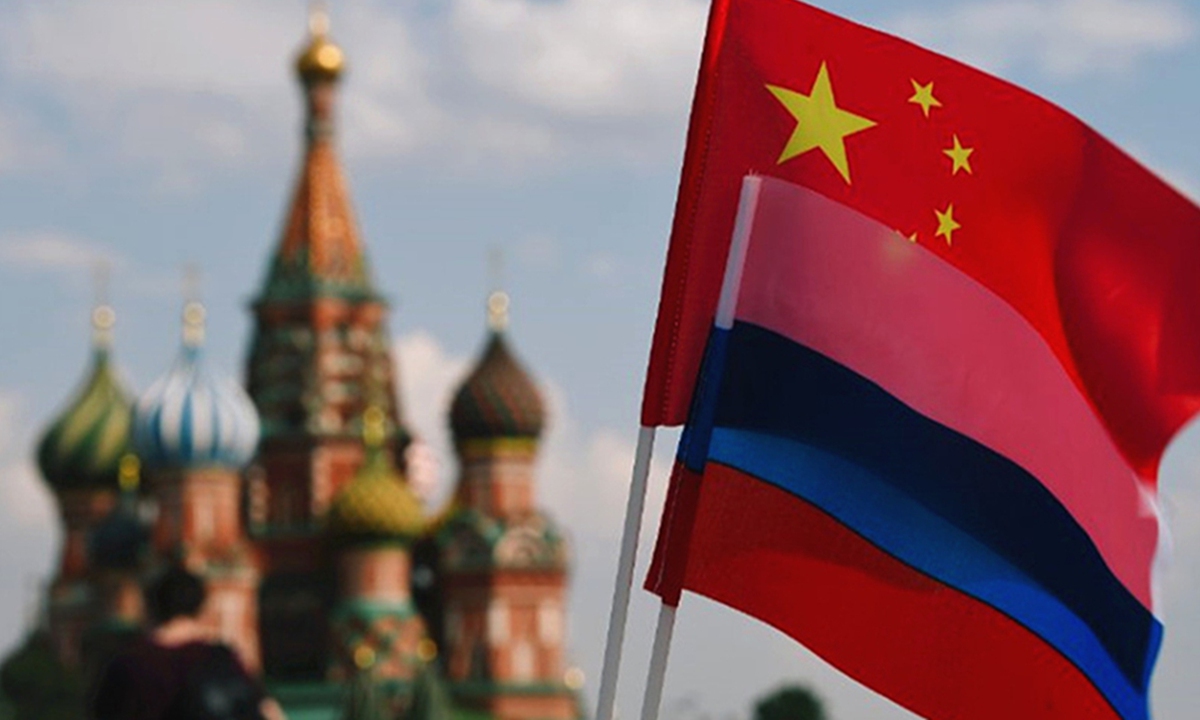
The national flags of China and Russia are seen on Red Square, Moscow. Photo: Xinhua
At the invitation of President Vladimir Putin of the Russian Federation, Chinese President Xi Jinping will pay a state visit to Russia from March 20 to 22. After the visit in 2013, once again, Xi has made Russia the destination of his first overseas trip after being elected as Chinese president. The Russia tour will further deepen strategic mutual trust and mutually beneficial cooperation between China and Russia, which will not only benefit the two countries and their peoples, but also bring more certainty to the international community amid numerous risks. It will be a trip of peace, friendship and cooperation.
Against the backdrop of the escalating Ukraine crisis and intensifying geopolitical tensions worldwide, the visit has attracted special attention from the international community and in the realm of public opinion. The news, when it was released on Friday afternoon, immediately sparked extensive interpretation and analysis, with many reports focusing on what role this visit will play in promoting peace talks and negotiations in the Ukraine crisis. The expectations from the international community toward China's head-of-state diplomacy can be strongly felt.
It should be pointed out that the Chinese and Russian heads of state have maintained a deep personal friendship and frequent interactions, and it is customary for the leaders of the two countries to visit each other every year. This visit falls within the scope of bilateral relations between China and Russia, and the focus is on further promoting and leading the continuous high-level development of the bilateral relationship. In other words, with or without the Ukraine crisis, the leaders of China and Russia will maintain normal exchanges and interactions. Fundamentally speaking, this is because the two countries have established a solid political, economic, and cultural foundation, and consolidating and deepening the China-Russia relationship is in the fundamental interests of the two peoples. At the same time, China and Russia both support multipolarity and the democratization of international relations, which is also a universal aspiration shared by the international community.
In the current complex and turbulent international situation, China and Russia have greater space for deepening their cooperation, while the significance of the China-Russia friendship becomes even more prominent. The strong complementarity of the two countries' economic structures creates tremendous potential for cooperation in the fields of energy, industry, technology and human resources. During Xi's visit to Russia, the two leaders will exchange in-depth views on practical cooperation of common concerns, including deepening the synergy between the Belt and Road Initiative and the Eurasian Economic Union, and jointly maintaining the stability and smooth flow of industrial and supply chains. The strategic cooperation between the two sides continues to expand, creating a model for a new type of major-country relations.
In recent years, one expression has been commonly used when it comes to China-Russia relations: non-alliance, non-confrontation and non-targeting of any third party. Now, another sentence has been added: It does not tolerate any third party's interference or coercion. These sentences are strong in their specificity. The new type of major-country relations between China and Russia has provided enlightenment to the world, in stark contrast to the behavior of some countries that are keen on creating various "small circles," forming cliques and engaging in bloc politics.
First, the interests of major countries do not necessarily have to be zero-sum. As long as they adhere to the principle of mutual respect and mutual benefit, and carry friendly sincerity, major countries can realize more of their common interests. Second, coordination and benign interaction between major countries is greatly beneficial to regional and even global peace and stability. Only when relations between major countries improve can the world get better.
President Xi's upcoming visit will also be a tour of peace. There is one major concern for the outside world: Does China have specific actions to bring about peace and promote talks during this visit? This expectation itself stems from China's continuous efforts to play a constructive role and ease the Ukraine crisis in its own way. China is one of the few major powers that can build a bridge of communications between Russia and Ukraine. This is even more precious as both sides in the conflict find themselves in a deadlock.
However, it must be said that China is not the cause of the Ukrainian crisis, nor a party to it. It is the US and Western countries that have got themselves deeply involved in the crisis. The key to solving the Ukraine crisis is not in China's hands, but in those of the US and Western countries. If they continue to stir up trouble instead of cooperating, it will be unlikely that any efforts to bring about peace and promote talks will be effective.
Regarding the Ukraine crisis, China's sincerity and goodwill are evident to all. In fact, whether it is in Ukraine or other turbulent regions, China has always been making great efforts for peace. From proposing the Global Security Initiative Concept Paper and China's Position on the Political Settlement of the Ukraine Crisis to hosting the Saudi Arabia-Iran dialogue in Beijing to promote the improvement of their bilateral relations, China's consistent position of maintaining peace and promoting talks is reflected in both its ideology and practice. The relevant documents are balanced and rational, reflecting the common aspirations of developing countries and peace-loving people around the world. They are the most practical and effective peace plan at present. All of these reflect how China has consistently lived up to its role as a responsible major power.
China-Russia relations have withstood the test of international turbulence and remained calm and clear-headed, always advancing in a steadfast manner and in a direction that benefits the peoples of both countries and the world. This relationship has stood the test of time and will write a weighty chapter of new type of major-power relations with honesty and transparency.




